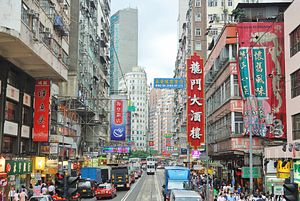The National People’s Congress Standing Committee’s (NPCSC) recent decision on Hong Kong’s future elections has drawn much attention. On this issue, Beijing’s attitude has been very clear: First, Hong Kong’s chief executive election is China’s domestic affair. Second, the political future of Hong Kong should be and must be realized within the framework of Hong Kong’s Basic Law. Third, the NPCSC’s decision on Hong Kong elections shows the central government’s strong will and determination to ensure progressive democracy as well as the prosperity and stability of Hong Kong.
Obviously, Hong Kong’s pan-democratic groups did not expect such a strong and uncompromising resolution from the central government. But the pan-democrats’ tendency to seek help from or consult with the West is completely unacceptable to Beijing and makes the central government very uncomfortable. Meanwhile, the “Occupy Central Movement” has been criticized by many Chinese as unreasonable.
There are deeper issues at work in the discussions about Hong Kong’s future elections. Beyond the specific issues, I believe there are two larger questions deserving of special attention.
First, there are basic questions as to the role and position of Hong Kong. What kind of region is Hong Kong? From a legal and political perspective, (for example, as outlined in the Constitution of the PRC and the Basic Law of Hong Kong), Hong Kong is a special region of China. It is special because it enjoys high degree of autonomy, but this does not mean that Hong Kong exists outside the oversight and control of the central government. On significant matters such as military affairs, diplomacy, and important political issues (such as Hong Kong’s chief executive elections), Beijing of course has the authority to make the final decision. This is an unchangeable fact and a bottom line that cannot be crossed.
From the perspective of economic development, Hong Kong has acted as a bridge between mainland China and the world economy for the past three decades: Hong Kong not only has facilitated mainland China’s economic rise but also has solidified its role as a world center of finance and trade during the same period. There are arguments that Hong Kong’s economic role has been challenged (by rivals like Shanghai, for example) since the late 1990s as mainland China’s economy has expanded significantly. However, it’s also an undeniable fact that Hong Kong’s economy has its own structural problems, such as its extreme reliance on financial services, which put Hong Kong in an extremely difficult situation during the 1998 financial crisis.
Given these circumstances, how should Hong Kong find its niche or reposition its economy? While the SAR’s political status is and will remain a matter of established fact, Hong Kong (and the central government) may need to think about finding a new role for Hong Kong to play in China’s overall economic development. Should Hong Kong seek more integration with the mainland’s economic development, or should it seek to shore up its own structural integrity and remain a more independent regional economy? Compared to the political aspirations of “Occupy Central Movement,” concerns about Hong Kong’s economic future might be more practical and more far-reaching.
The second large issue behind the current debates is the question of Hongkonger’s sense of identity. This is a far more complicated and influential issue. For example, Beijing may find it both necessary and urgent to push forward national patriotic education in Hong Kong and increase personnel communications through various policies. But in so doing, the central government inevitably bumps up against certain concerns: differences in political culture, public ideology, and values. All these subtle but powerful factors have contributed to a certain level of divergence between Hong Kong and mainland China.
Moreover, the differences in people’s customs, behaviors, and manners are reflected in street-level tussles that have made their way into Chinese and even international media. These differences have a real impact on Hongkonger’s sense of self-identification. According to research by the University of Hong Kong’s Public Opinion Programme, the percentage of Hongkongers self-identifying as “Chinese” has dropped to a 14-year low (19.5 percent), despite efforts from Beijing to foster Chinese identity. In other words, many Hongkongers still lack a sense of common identity with mainland China. This is an important issue, and it cannot be easily solved by simply choosing a candidate with of a certain political background (whether pro-Beijing or pro-democracy) as the chief executive for Hong Kong.
































